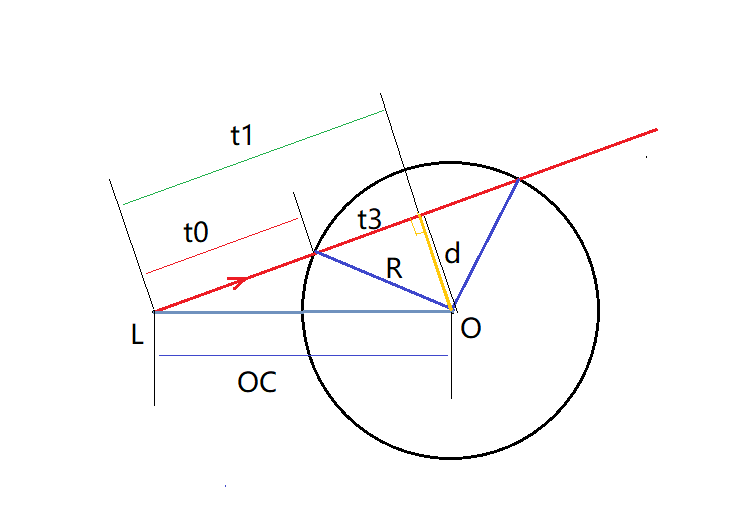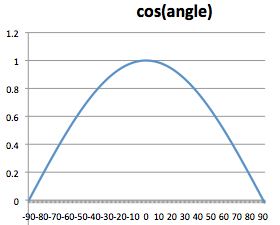ShaderToy绘制球体
嗯,其实渲染球体,可以看做就是一个2d圆形图案+渲染光泽的函数。
定义球体结构——半径,球心坐标
struct Sphere {
vec3 center;
float radius;
};
定义光线——光源坐标,方向
struct Ray {
vec3 origin;
vec3 direction;
};
检测“光线”与“球体”是否相交,若未相交返回false,相交返回从光源到球面的距离
数学解释如下

图中红色线条即光线,重要线段已标注变量,光照方向记作向量Dir。
首先,需要判断光线是否照射到球面,转化为数学问题,即光线所在直线是否与球相交。
在一个平面内,一条线与一个球形的关系有三种——相交、相切、相离。
其中相切作为一个中间状态是很好判断的,当光线与球面相切,必然存在:
R = d
t1² = OC² - R²
如此,余下的两种状态也很好判断了。
假若线段t1的长度小于从光源出发到球形的切线段长,则光线必然与球形相交;反之,则与球形相离。
接下来,计算从光源到球面相交点的距离。
如图中所示,最终所求距离即线段t0长度:
t1 = OC·Dir (此处用到点乘)
d² = OC² - t1²
t3² = R² - d²
t0 = t1 - sqrt (t3)
代码表示如下:
float intersectSphere(in Ray ray, in Sphere sphere) {
vec3 co = ray.origin - sphere.center;
float discriminant = dot(co, ray.direction) * dot(co, ray.direction)
- (dot(co, co) - sphere.radius * sphere.radius);
if (discriminant >= 0.0) //相交或相切
return -dot(co, ray.direction)-sqrt(discriminant); //返回光源到球面距离
else //相离返回-1
return -1.;
}
最后,是光照漫反射的方程,这里用到物理学上的兰伯特余弦定律(Lambert Cosine’s Law),即光照漫反射时的强度,遵循光线向量与法线向量间夹角余弦值的变化。
如下图,即随着光线向量与法线夹角增大,漫反射光的强度越弱。

漫反射代码如下:
vec4 diffuse(in vec3 surface, in vec3 center, in vec4 color, in vec3 litePos) {
// Surface normal
vec3 n = normalize(surface - center);
// Light direction from surface
vec3 l = normalize(litePos - surface);
// The diffuse equation
return color * max(0.0, dot(n, l));
}
最终返回反射光的颜色。
绘制阶段。
void mainImage( out vec4 fragColor, in vec2 fragCoord ) {
float x = fragCoord.x / iResolution.x;
float y = fragCoord.y*.6 / iResolution.y;
vec4 m = iMouse / iResolution.xyxy;
x = x * 3.0 ;
y = y * 3.0 - 1.;
vec3 pixelPos = vec3(x, y, 0);
vec3 eyePos = vec3(0, 0, -4);
vec3 rayDir = normalize(pixelPos - eyePos)*(1.);
Sphere sphere = Sphere(vec3(3.5, 0., 5.0), 1.0);
float eyeToSphere = intersectSphere(Ray(eyePos, rayDir), sphere);
fragColor = vec4(0.1, 0.1, 0.1, 1);
if (eyeToSphere >= 0.)
{
//漫射颜色
vec4 diffuseColour = vec4(0.4,0.4,0.4,1.);
//周边颜色
vec4 ambientColour = vec4(0.8,0.1,0.1,1.);
//光亮位置
vec3 litePos = vec3(m.x*10., m.y*10., 1.);
fragColor = ambientColour + diffuse(eyePos + eyeToSphere * rayDir, sphere.center, diffuseColour, litePos);
}
}
绘制效果: